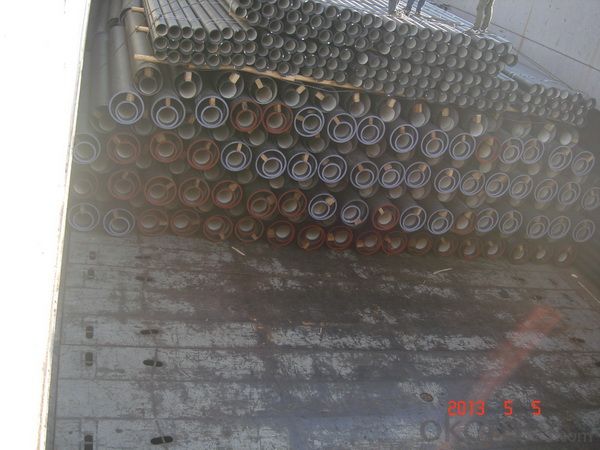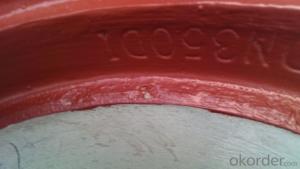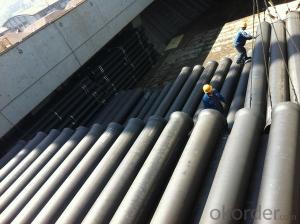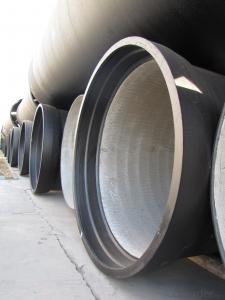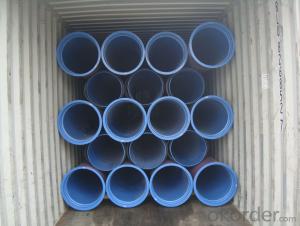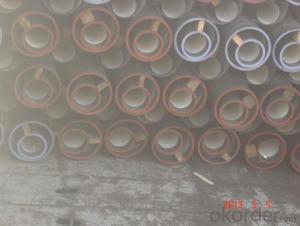T Type Ductile Iron Pipe DN80 socket spigot pipe
- Loading Port:
- Tianjin
- Payment Terms:
- TT OR LC
- Min Order Qty:
- 200
- Supply Capability:
- 80000 /month
OKorder Service Pledge
OKorder Financial Service
You Might Also Like
1) The standard of pipe: ISO2531:1998, EN545:2006,K9 K8
2) Effective length: 6m/5.7m
3) Inner cement line: Portland cement lineas per ISO4179
4) Zinc coating: at least 130g/m2 as per ISO8179
5) Bitumen painting: at least 70μm as per ISO8179
6)With 102% quantity of NBR, SBR, or EPDM ring asper ISO4633
7) DN80-DN1200
8) Highstrength, lighter than grey iron, good corrosion resistance, no furring, smallflow resistance, easy fixing, long life tome about 100 yeas
9)Checked by automatic inspection equipment
10) Composition:
Chemical composition | |||
Chemical composition | Ductile Cast Iron Pipe (%) | Grey iron pipe (%) | Steel pipe (%) |
C | 3.5-4.0 | 3.2-3.8 | 0.1-0.2 |
Si | 1.9-2.6 | 1.4-2.2 | 0.15-0.4 |
Mn | 0.15-0.45 | 0.4-0.6 | 0.3-0.6 |
P | ≤0.06 | ≤0.3 | 0.02-0.03 |
S | ≤0.02 | ≤0.1 | 0.02-0.03 |
Mg | 0.03-0.06 |
|
|
11) Feature:
Mechanical properties | |||
| Ductile Cast Iron Pipe | Grey Iron Pipe | Steel Pipe |
Tensile Strength(Mpa) | ≥420 | 150-260 | ≥400 |
Yield Strength(Mpa) | ≥300 | No Confirmation | No Confirmation |
Bending Strength(Mpa) | ≥590 | 200-360 | ≥400 |
Elongation (%) | ≥10 | Neglected | ≥18 |
Brinell Hardness(HBS) | ≤230 | ≤230 | About 140 |
12) T type mechanical joint
13) Packing: in bulk or container
PACKING: 1) Pipesare bundled together with the steel belt.
2) Wooden pieces are put between the pipes.
- Q: How to choose a ductile cast iron pipe with guaranteed quality
- Cutting testing: iron filing resistance, filing issued a "Shua" sound, little sticky file, debris was gray with a small amount of white spot, look at the particles of different size, with small particles of fine powder, finger milling, it is easy to make fingers black. Ductile iron filing: when the resistance ratio of gray iron is slightly larger, there are obvious "Shua" sound ", little sticky file, debris was gray with fine bright particles ranging in size but with large particles, with finger milling chips, can be dyed black to gray fingers, but more black the degree of light
- Q: Are ductile iron pipes suitable for high-temperature applications?
- Ductile iron pipes are generally not suitable for high-temperature applications. While ductile iron is known for its strength and durability, it has limitations when it comes to high temperatures. Ductile iron pipes are typically rated for a maximum operating temperature of around 250-300 degrees Fahrenheit (120-150 degrees Celsius). At higher temperatures, ductile iron pipes can experience thermal expansion, which may lead to cracking or distortion. This can compromise the structural integrity of the pipe and potentially cause leaks or failures. Additionally, ductile iron is susceptible to oxidation at elevated temperatures, which can further degrade the pipe's performance over time. For high-temperature applications, it is generally recommended to use materials specifically designed for such conditions, such as stainless steel or high-temperature alloys. These materials offer better resistance to thermal expansion, oxidation, and other factors associated with high temperatures.
- Q: Are ductile iron pipes suitable for use in cold climates?
- Yes, ductile iron pipes are suitable for use in cold climates. Ductile iron possesses excellent resistance to low temperatures, making it highly suitable for use in freezing conditions. Its high durability and strength enable it to withstand extreme temperatures and harsh weather conditions commonly found in cold climates.
- Q: Can ductile iron pipes be used for agricultural applications?
- Yes, ductile iron pipes can be used for agricultural applications. Ductile iron pipes are known for their durability, strength, and corrosion resistance, making them suitable for various agricultural applications such as irrigation systems, water supply networks, and drainage systems.
- Q: Can ductile iron pipes be used for trenchless pipe rehabilitation methods?
- Yes, ductile iron pipes can be used for trenchless pipe rehabilitation methods. Trenchless methods such as cured-in-place pipe lining or pipe bursting can effectively repair and rehabilitate ductile iron pipes without the need for extensive excavation. These methods provide a cost-effective and efficient solution for rehabilitating aging or damaged ductile iron pipes while minimizing disruption to the surrounding environment.
- Q: Can ductile iron pipes be used for irrigation systems?
- Certainly, irrigation systems can utilize ductile iron pipes. These pipes possess exceptional strength and durability, rendering them appropriate for a wide range of uses, including irrigation. They exhibit resistance to corrosion and boast a lengthy lifespan, guaranteeing their ability to endure the challenging conditions frequently associated with irrigation systems. Moreover, ductile iron pipes possess a sleek inner surface, facilitating efficient water flow and minimizing friction loss. This renders them highly suitable for the transportation of water over extensive distances, thereby ensuring the thorough irrigation of crops or landscapes. In summary, ductile iron pipes represent a dependable and economically viable option for irrigation systems.
- Q: Are ductile iron pipes suitable for use in mining tailings pipelines?
- Mining tailings pipelines can utilize ductile iron pipes due to their suitability for this purpose. These pipes possess remarkable strength and durability, enabling them to endure the harsh and abrasive conditions often encountered in mining operations. With their high tensile strength, they can effectively handle the pressure and weight of the tailings material. Furthermore, their resistance to corrosion is crucial in mining environments where the tailings may contain corrosive chemicals or substances. Moreover, ductile iron pipes are known for their ease of installation and maintenance, providing a valuable advantage in time-sensitive mining operations. Ultimately, ductile iron pipes offer a dependable and cost-effective solution for mining tailings pipelines.
- Q: How does ductile iron pipe resist internal corrosion?
- Ductile iron pipe resists internal corrosion through a combination of its unique material properties and protective coatings. Firstly, ductile iron, also known as nodular cast iron, is made by adding magnesium to molten iron, which causes the graphite in the material to be nodular or spherical in shape. This results in a more flexible and elastic material compared to traditional cast iron, making it less prone to cracking or fracturing under stress. Additionally, ductile iron has a dense, microstructure with a high carbon content, which acts as a barrier to prevent corrosive elements from penetrating the pipe's surface. This inherent resistance to corrosion makes ductile iron pipe suitable for carrying various fluids such as water, sewage, and chemicals without the risk of degradation over time. Furthermore, ductile iron pipes are often internally lined with protective coatings to further enhance their resistance to corrosion. These coatings, such as cement mortar or epoxy, create a barrier between the pipe's surface and the fluid it carries, preventing direct contact and reducing the likelihood of corrosion. These linings are applied during the manufacturing process, ensuring a consistent and durable protection throughout the entire length of the pipe. In summary, ductile iron pipe resists internal corrosion due to its material composition, including the nodular graphite structure and high carbon content, as well as the application of protective coatings. This combination of factors ensures the longevity and reliability of ductile iron pipes in various applications, even in corrosive environments.
- Q: Are ductile iron pipes suitable for use in hydroelectric dams?
- Yes, ductile iron pipes are suitable for use in hydroelectric dams. Ductile iron is a type of iron that has a higher degree of flexibility and strength compared to traditional cast iron. This makes it an ideal choice for many applications, including water transmission systems in hydroelectric dams. Ductile iron pipes are known for their durability and resistance to corrosion, which is crucial in a dam environment where water exposure is constant. They can withstand high pressures and extreme temperatures, making them suitable for the demanding conditions found within hydroelectric dams. Additionally, ductile iron pipes have excellent joint integrity, ensuring that they remain leak-proof and reliable over their lifespan. This is important for maintaining the efficiency and effectiveness of a hydroelectric dam's water transmission system. Furthermore, ductile iron pipes are cost-effective compared to other materials, such as steel or concrete. They have a long service life, require minimal maintenance, and are readily available, making them a practical choice for hydroelectric dam projects. In conclusion, ductile iron pipes are a suitable choice for use in hydroelectric dams due to their durability, resistance to corrosion, high-pressure tolerance, joint integrity, and cost-effectiveness. They provide the necessary strength and flexibility to efficiently transport water within the dam, contributing to the overall success and longevity of the hydroelectric power generation system.
- Q: The difference between spheroidal graphite cast iron pipe and HDPE water supply pipe
- Because the HDPE pipe flexibility is good, in the face of obstacles or trench excavation in straight pipe laying conditions can not directly, but the ductile iron pipe can not, it is sometimes necessary to use the words such as elbow or tube fittings to connect the transition. In this way, the HDPE pipe is superior to the ductile iron pipe in the pipe fittings.
Send your message to us
T Type Ductile Iron Pipe DN80 socket spigot pipe
- Loading Port:
- Tianjin
- Payment Terms:
- TT OR LC
- Min Order Qty:
- 200
- Supply Capability:
- 80000 /month
OKorder Service Pledge
OKorder Financial Service
Similar products
Hot products
Hot Searches
Related keywords

